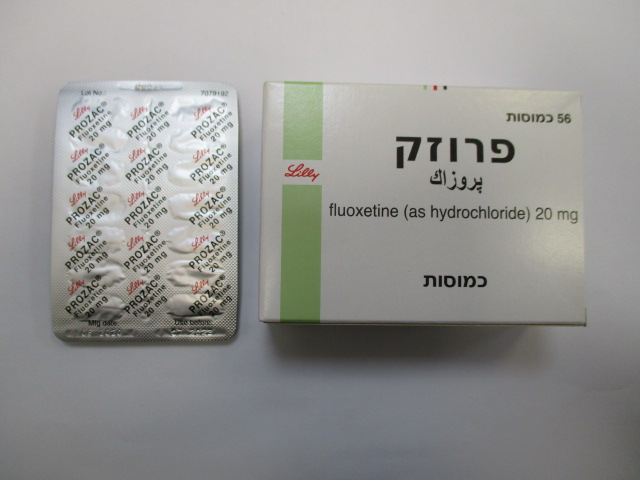Quest for the right Drug

פרוזק PROZAC (FLUOXETINE AS HYDROCHLORIDE)
תרופה במרשם
תרופה בסל
נרקוטיקה
ציטוטוקסיקה
צורת מתן:
פומי : PER OS
צורת מינון:
קפסולות : CAPSULES
עלון לרופא
מינוניםPosology התוויות
Indications תופעות לוואי
Adverse reactions התוויות נגד
Contraindications אינטראקציות
Interactions מינון יתר
Overdose הריון/הנקה
Pregnancy & Lactation אוכלוסיות מיוחדות
Special populations תכונות פרמקולוגיות
Pharmacological properties מידע רוקחי
Pharmaceutical particulars אזהרת שימוש
Special Warning עלון לרופא
Physicians Leaflet
Posology : מינונים
4.2 Posology and method of administration Posology Adults Major Depressive Disorder Adults and the elderly: The recommended dose is 20 mg daily. Dosage should be reviewed and adjusted if necessary within 3 to 4 weeks of initiation of therapy and thereafter as judged clinically appropriate. Although there may be an increased potential for undesirable effects at higher doses, in some patients, with insufficient response to 20 mg, the dose may be increased gradually up to a maximum of 60 mg (see section 5.1). Dosage adjustments should be made carefully on an individual patient basis, to maintain the patients at the lowest effective dose. Patients with depression should be treated for a sufficient period of at least 6 months to ensure that they are free from symptoms. Obsessive Compulsive Disorder Adults and the elderly: The recommended dose is 20 mg daily. Although there may be an increased potential for undesirable effects at higher doses, in some patients, if after two weeks there is insufficient response to 20 mg, the dose may be increased gradually up to a maximum of 60 mg. If no improvement is observed within 10 weeks, treatment with fluoxetine should be reconsidered. If a good therapeutic response has been obtained, treatment can be continued at a dosage adjusted on an individual basis. While there are no systematic studies to answer the question of how long to continue fluoxetine treatment, OCD is a chronic condition and it is reasonable to consider continuation beyond 10 weeks in responding patients. Dosage adjustments should be made carefully on an individual patient basis, to maintain the patient at the lowest effective dose. The need for treatment should be reassessed periodically. Some clinicians advocate concomitant behavioral psychotherapy for patients who have done well on pharmacotherapy. Long-term efficacy (more than 24 weeks) has not been demonstrated in OCD. Bulimia Nervosa Adults and the elderly: A dose of 60 mg/day is recommended. Long-term efficacy (more than 3 months) has not been demonstrated in bulimia nervosa. All indications The recommended dose may be increased or decreased. Doses above 80 mg/day have not been systematically evaluated. Pediatric population - Children and adolescents aged 8 years and above (Moderate to severe major depressive episode) Treatment should be initiated and monitored under specialist supervision. The starting dose is 10 mg/day fluoxetine (as hydrochloride) given as oral solution (there is a drug from another company, which comes as a solution). Dose adjustments should be made carefully, on an individual basis, to maintain the patient at the lowest effective dose. After one to two weeks, the dose may be increased to 20 mg/day. Clinical trial experience with daily doses greater than 20 mg is minimal. There is only limited data on treatment beyond 9 weeks. Lower weight children: Due to higher plasma levels in lower weight children, the therapeutic effect may be achieved with lower doses (see section 5.2). For pediatric patients who respond to treatment, the need for continued treatment after 6 months should be reviewed. If no clinical benefit is achieved within 9 weeks, treatment should be reconsidered. Elderly patients Caution is recommended when increasing the dose and the daily dose should generally not exceed 40 mg. Maximum recommended dose is 60 mg/day. Hepatic impairment A lower or less frequent dose (e.g. 20 mg every second day) should be considered in patients with hepatic impairment (see section 5.2), or in patients where concomitant medication has the potential for interaction with Prozac (see section 4.5). Withdrawal symptoms seen on discontinuation of Prozac: Abrupt discontinuation should be avoided. When stopping treatment with Prozac the dose should be gradually reduced over a period of at least one to two weeks in order to reduce the risk of withdrawal reactions (see sections 4.4 and 4.8). If intolerable symptoms occur following a decrease in the dose or upon discontinuation of treatment, then resuming the previously prescribed dose may be considered. Subsequently, the physician may continue decreasing the dose, but at a more gradual rate. Method of administration For oral administration. Fluoxetine may be administered as a single or divided dose, during or between meals. When dosing is stopped, active drug substances will persist in the body for weeks. This should be borne in mind when starting or stopping treatment.

שימוש לפי פנקס קופ''ח כללית 1994
Depressive illness. יירשם ע"י רופא פסיכיאטר ורופא עצבים
תאריך הכללה מקורי בסל
01/01/1995
הגבלות
תרופה מוגבלת לרישום ע'י רופא מומחה או הגבלה אחרת
מידע נוסף
עלון מידע לצרכן
13.05.18 - עלון לצרכן 20.07.21 - עלון לצרכן אנגלית 05.04.21 - עלון לצרכן עברית 20.07.21 - עלון לצרכן ערבית 11.05.23 - עלון לצרכן עברית 27.09.23 - עלון לצרכן אנגלית 27.09.23 - עלון לצרכן ערבית 26.08.24 - עלון לצרכן עברית 28.10.24 - עלון לצרכן אנגלית 28.10.24 - עלון לצרכן ערבית 25.03.12 - החמרה לעלון 30.06.13 - החמרה לעלון 21.01.15 - החמרה לעלון 03.03.20 - החמרה לעלון 02.08.20 - החמרה לעלון 08.09.20 - החמרה לעלון 05.04.21 - החמרה לעלון 11.05.23 - החמרה לעלוןלתרופה במאגר משרד הבריאות
פרוזק